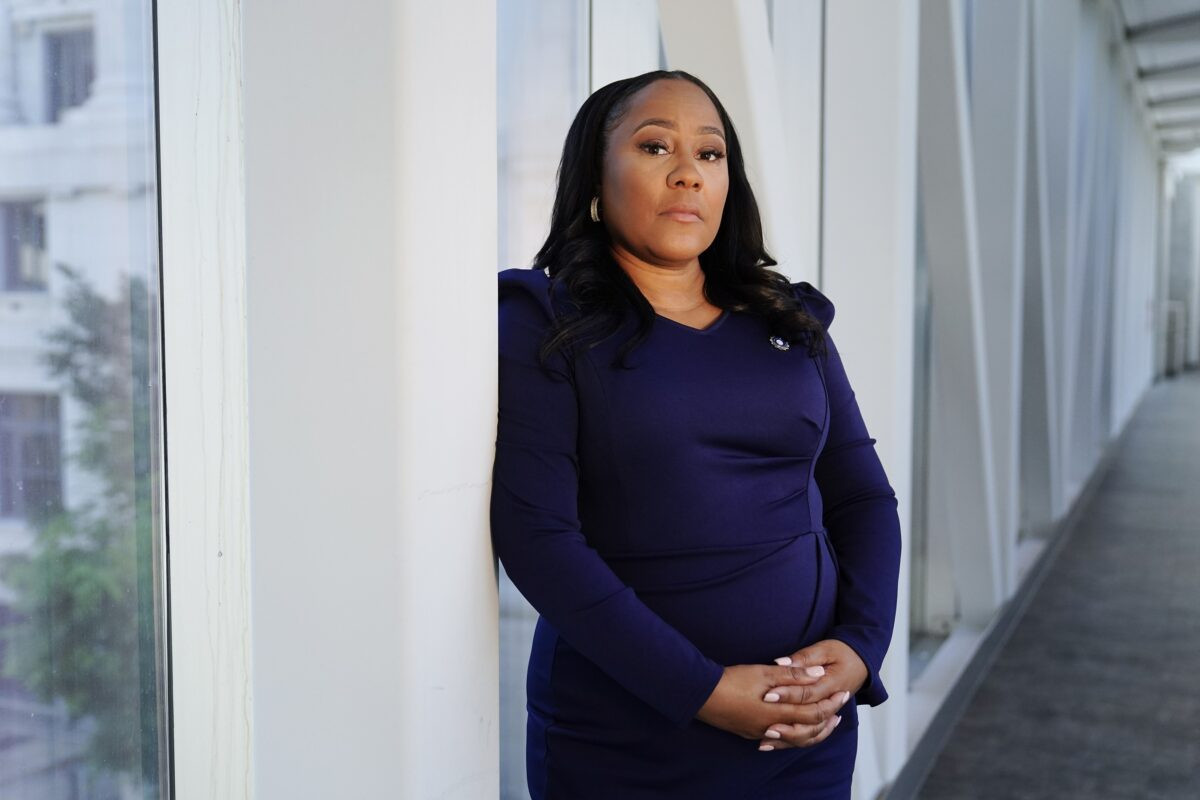

The prosecutor investigating whether former President Donald Trump and others illegally interfered in Georgia’s 2020 presidential election appeared to suggest on May 18 that any grand jury indictments in the case are likely to come in August.
In a letter (pdf) to Fulton County Superior Court Chief Judge Ural Glanville, Fulton County District Attorney Fani Willis advised that the majority of her staff would be working remotely on July 31 and most days during the first three weeks of August for safety purposes.
“I respectfully request that judges not schedule trials and in person hearings during the weeks beginning Monday, August 7 and Monday, August 14,” Willis wrote, requesting that judges who planned to proceed with in-person hearings notify her office so her staff could prepare.
“Thank you for your consideration and assistance in keeping the Fulton County Judicial Complex safe during this time,” she added.
Copied on the letter were 20 other county officials.
Willis’ latest communication follows an April 24 letter (pdf) she sent to Fulton County Sheriff Patrick Labat requesting “heightened security and preparedness” in the coming months due to the upcoming announcement of charging decisions in her 2020 election investigation.
“Open-source intelligence has indicated the announcement of decisions in this case may provoke a significant public reaction,” the district attorney noted in that letter. “We have seen in recent years that some may go outside of public expressions of opinion that are protected by the First Amendment to engage in acts of violence that will endanger the safety of our community. As leaders, it is incumbent upon us to prepare.”
At that time, Willis indicated that the announcement of charges would come between July 11 and Sept. 1. The new letter seems to indicate a narrowing of that timeline.
The district attorney’s investigation centers on a January 2021 phone call during which Trump asked Georgia Secretary of State Brad Raffensperger to investigate claims of voter fraud in the state’s 2020 election.
Willis has been investigating whether that call and the post-election actions of other Trump allies amounted to unlawful election interference.
The special purpose grand jury in the case was discharged in January and purportedly recommended indictments in the case. And while the names of those recommended for indictment have yet to be released publicly, according to Emily Kohrs, the foreperson of the grand jury, multiple indictments were recommended.
“It is not a short list,” Kohrs told The New York Times in February as part of her controversial media tour after the grand jury was discharged.
Citing that tour, Trump’s legal team filed a motion in March to quash the special grand jury’s report and preclude its use in the case.
In the same motion, Trump also sought to disqualify Willis from prosecuting the case, holding that she had a conflict of interest and had engaged in prosecutorial misconduct.
The Georgia probe is just one of four criminal investigations the 45th president is facing as he vies for a second presidential term.
In addition to federal investigations into his handling of classified materials and his conduct following the 2020 election, Trump is also fending off charges for alleged falsification of business records in New York.
In all four cases, Trump has maintained his innocence, holding that they are just an extension of the Democrats’ ongoing political “witch hunt” aimed at keeping him out of the White House.
“From the time I came down the golden escalator at Trump Tower, and even before I was sworn in as your President of the United States, the Radical Left Democrats—the enemy of the hard-working men and women of this Country—have been engaged in a Witch-Hunt to destroy the Make America Great Again movement,” Trump said in a March 30 statement.
“I believe this Witch-Hunt will backfire massively on Joe Biden,” Trump added. “The American people realize exactly what the radical left Democrats are doing here. Everyone can see it.”
Katabella Roberts contributed to this report.


![Enjoy the [Road] Show Travel Mug with Handle, 14ozEnjoy the [Road] Show Travel Mug with Handle, 14oz](https://georgemagazine.com/wp-content/uploads/2024/08/479070202831754764_2048-300x300.jpeg)

Discount Applied Successfully!
Your savings have been added to the cart.